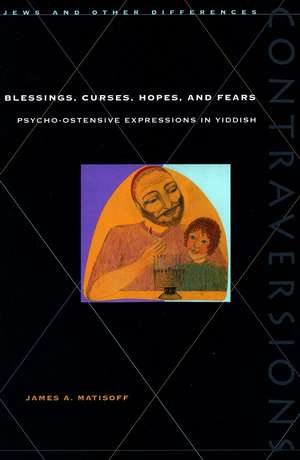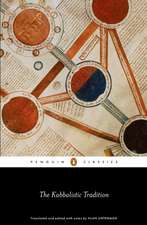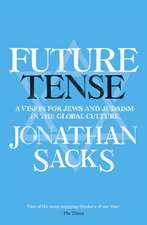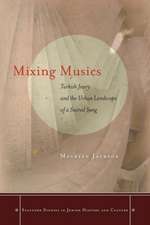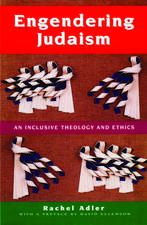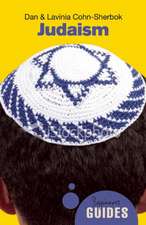Blessings, Curses, Hopes, and Fears: Psycho-Ostensive Expressions in Yiddish: Contraversions: Jews and Other Differences
Autor James Matisoffen Limba Engleză Paperback – mai 2000
In this delightful book, the author enumerates and classifies the formulas Yiddish speakers use to express their emotions. It is a rarity among scholarly books, for it brings joy while it teaches; it makes us smile, sometimes roar with laughter, while it develops the most rigorous linguistic argumentation. The author analyzes the many kinds of Yiddish "psycho-ostensives"—ranging from blessings and thanks to lamentations and curses. To a person who mentions something horrible you can say: Zalts dir in di oygn, fefer dir in noz! ("Salt into your eyes, and pepper into your nose!"). Or to a child you might tenderly murmur: A gezúnt dir in yeder éyverl! ("A health to all your little body-parts!"). The author illustrates how these formulas can be used to fulfill social conventions, to keep away evil, to show off—or even to deceive the listener.
Comments [1999]
"I have known and profited from this book for many years, and its interest for linguistics and Yiddish studies has grown steadily. The book will have three audiences: specialists in Yiddish; linguists, psychologists, and anthropologists who are interested in the emotional side of language; and general linguists familiar with Matisoff's outstanding contributions, both witty and insightful, in other linguistic fields."
—William Labov,
University of Pennsylvania
"Matisoff's book was pathbreaking, innovative, and crucially important when it was first published and remains so today. It is as relevant as it was then, if not more so. Matisoff is a consummate scholar and also an excellent writer: clear and weighty but also whimsical and witty." —Deborah Tannen,
Georgetown University
Comments [1999]
"I have known and profited from this book for many years, and its interest for linguistics and Yiddish studies has grown steadily. The book will have three audiences: specialists in Yiddish; linguists, psychologists, and anthropologists who are interested in the emotional side of language; and general linguists familiar with Matisoff's outstanding contributions, both witty and insightful, in other linguistic fields."
—William Labov,
University of Pennsylvania
"Matisoff's book was pathbreaking, innovative, and crucially important when it was first published and remains so today. It is as relevant as it was then, if not more so. Matisoff is a consummate scholar and also an excellent writer: clear and weighty but also whimsical and witty." —Deborah Tannen,
Georgetown University
| Toate formatele și edițiile | Preț | Express |
|---|---|---|
| Paperback (1) | 152.17 lei 22-36 zile | |
| Stanford University Press – mai 2000 | 152.17 lei 22-36 zile | |
| Hardback (1) | 587.79 lei 43-57 zile | |
| Stanford University Press – 31 mar 2000 | 587.79 lei 43-57 zile |
Din seria Contraversions: Jews and Other Differences
-
 Preț: 212.22 lei
Preț: 212.22 lei -
 Preț: 220.91 lei
Preț: 220.91 lei -
 Preț: 267.56 lei
Preț: 267.56 lei - 19%
 Preț: 587.79 lei
Preț: 587.79 lei -
 Preț: 203.20 lei
Preț: 203.20 lei -
 Preț: 248.93 lei
Preț: 248.93 lei -
 Preț: 158.52 lei
Preț: 158.52 lei -
 Preț: 248.06 lei
Preț: 248.06 lei -
 Preț: 189.66 lei
Preț: 189.66 lei - 19%
 Preț: 644.84 lei
Preț: 644.84 lei -
 Preț: 227.27 lei
Preț: 227.27 lei - 19%
 Preț: 597.00 lei
Preț: 597.00 lei -
 Preț: 224.94 lei
Preț: 224.94 lei - 19%
 Preț: 511.05 lei
Preț: 511.05 lei - 19%
 Preț: 445.54 lei
Preț: 445.54 lei - 19%
 Preț: 475.32 lei
Preț: 475.32 lei -
 Preț: 263.05 lei
Preț: 263.05 lei - 23%
 Preț: 891.81 lei
Preț: 891.81 lei -
 Preț: 521.36 lei
Preț: 521.36 lei
Preț: 152.17 lei
Nou
Puncte Express: 228
Preț estimativ în valută:
29.12€ • 30.23$ • 24.28£
29.12€ • 30.23$ • 24.28£
Carte disponibilă
Livrare economică 03-17 martie
Preluare comenzi: 021 569.72.76
Specificații
ISBN-13: 9780804733946
ISBN-10: 0804733945
Pagini: 200
Dimensiuni: 152 x 229 x 20 mm
Greutate: 0.3 kg
Ediția:1
Editura: Stanford University Press
Colecția Stanford University Press
Seria Contraversions: Jews and Other Differences
ISBN-10: 0804733945
Pagini: 200
Dimensiuni: 152 x 229 x 20 mm
Greutate: 0.3 kg
Ediția:1
Editura: Stanford University Press
Colecția Stanford University Press
Seria Contraversions: Jews and Other Differences
Recenzii
"Don't be put off by the subtitle of this incredibly witty, informative, and entertaining analysis of the linguistic subtleties of Yiddish. In using the term "psycho-ostensive," the author refers to the heavy emotional baggage that Yiddish speakers carry around with them: their language is full of linguistic subtexts that mask, obfuscate, and hide the true feelings in the heart of the speaker."—Arnold Ages, Jewish Tribune
"It may be said of Matisoff's treatise that it shows how Yiddish, through its linguistic delicacies, offered its speakers and listeners valuable therapeutic tools to cope with the perplexing world they encountered. Exploring that wolrd with Matisoff is a recreation, a joy, and "a gan Eden." That's Hebrew and Yiddish for paradise."—Arnold Ages, Jewish Tribune
Textul de pe ultima copertă
“Don’t be put off by the subtitle of this incredibly witty, informative, and entertaining analysis of the linguistic subtleties of Yiddish. In using the term “psycho-ostensive,” the author refers to the heavy emotional baggage that Yiddish speakers carry around with them: their language is full of linguistic subtexts that mask, obfuscate, and hide the true feelings in the heart of the speaker.”—Arnold Ages, Jewish Tribune
“It may be said of Matisoff’s treatise that it shows how Yiddish, through its linguistic delicacies, offered its speakers and listeners valuable therapeutic tools to cope with the perplexing world they encountered. Exploring that wolrd with Matisoff is a recreation, a joy, and “a gan Eden.” That’s Hebrew and Yiddish for paradise.”—Arnold Ages, Jewish Tribune
“It may be said of Matisoff’s treatise that it shows how Yiddish, through its linguistic delicacies, offered its speakers and listeners valuable therapeutic tools to cope with the perplexing world they encountered. Exploring that wolrd with Matisoff is a recreation, a joy, and “a gan Eden.” That’s Hebrew and Yiddish for paradise.”—Arnold Ages, Jewish Tribune
Descriere
In this delightful book, the author enumerates and classifies the formulas Yiddish speakers use to express their emotions—from blessings and thanks to lamentations and curses. A rarity among scholarly books, it brings joy while it teaches; it makes us smile, sometimes roar with laughter, while it develops the most rigorous linguistic argumentation.
